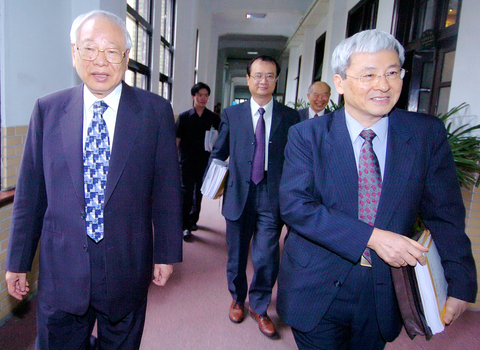Fingerprints will not be collected when people apply for their new national identification cards until the Council of Grand Justices issues an interpretation of the Household Registration Law (
Judicial Yuan Secretary-General Fan Kuang-chun (范光群) held a press conference yesterday on behalf of the council to announce the justices' decision to issue an interim order temporarily suspending the fingerprint policy until the council can rule on the matter.
According to Articles 8-2 and 8-3 of the law, applicants must provide their fingerprints when applying for the new photo ID cards, due to be issued starting July 1.

PHOTO: LIAO CHEN-HUI, TAIPEI TIMES
"We will follow the grand justices' interim order. That means the collection of fingerprints will be temporarily suspended," said Cabinet spokesman Cho Jung-tai (
Cho said those applying for the new cards will receive the old version until the grand justices issue an interpretation.
However, "If the grand justices decide that the fingerprinting policy must be carried out anyway, they will have to re-apply for the new cards and provide their fingerprints. If the justices decide against the policy, these people will still have to apply for the new cards but their fingerprints will not be taken," Cho said.
The Democratic Progressive Party legislative caucus complained that the fingerprint requirement violates both human rights and the Constitution. The caucus filed a request with the Council of Grand Justices for an interpretation on May 30.
According to Fan, 14 grand justices met yesterday morning. At around 1pm they decided to ask the Cabinet to suspend the policy.
According to Cho, there are two possible scenarios.
If the grand justices say the two articles violate the Constitution and should be amended, the law will be returned to the legislature for an amendment and new photo ID cards will not be issued before the amendment is passed.
If grand justices say the two articles are fine, then the fingerprinting policy will be resumed.
"Now that the interim order has been given, I think most people won't rush to apply for their photo ID cards, so I don't think the impact will be humongous," Cho said.
By law, every citizen older than 14 years of age must apply for a national ID card, providing their fingerprints and a new head-shot photo taken within the past six months. The photo has to be in a square format, with a white background and the face uncovered. Each of the new-format photos costs approximately NT$200.
Asked whether the government is ready to hear complaints from those who have already had their pictures taken, Interior Minister Su Jia-chyan (
"I believe that the grand justices will come up with a final ruling soon," Su said.
"In the meantime, I urge the public not to apply for the new cards before receiving an official notice from us," he said.

Tropical Storm Gaemi strengthened into a typhoon at 2pm yesterday, and could make landfall in Yilan County tomorrow, the Central Weather Administration (CWA) said yesterday. The agency was scheduled to issue a sea warning at 11:30pm yesterday, and could issue a land warning later today. Gaemi was moving north-northwest at 4kph, carrying maximum sustained winds near its center of up to 118.8kph and gusts of 154.8kph. The circumference is forecast to reach eastern Taiwan tomorrow morning, with the center making landfall in Yilan County later that night before departing from the north coast, CWA weather forecaster Kuan Shin-ping (官欣平) said yesterday. Uncertainty remains and

SEA WARNING LIKELY: The storm, named Gaemi, could become a moderate typhoon on Wednesday or Thursday, with the Taipei City Government preparing for flooding A tropical depression east of the Philippines developed into a tropical storm named Gaemi at 2pm yesterday, and was moving toward eastern Taiwan, the Central Weather Administration (CWA) said. Gaemi could begin to affect Taiwan proper on Tuesday, lasting until Friday, and could develop into a moderate typhoon on Wednesday or Thursday, it said. A sea warning for Gaemi could be issued as early as Tuesday morning, it added. Gaemi, the third tropical storm in the Pacific Ocean this typhoon season, is projected to begin moving northwest today, and be closest to Taiwan on Wednesday or Thursday, the agency said. Today, there would likely

DISRUPTIONS: The high-speed rail is to operate as normal, while several airlines either canceled flights or announced early departures or late arrivals Schools and offices in 15 cities and counties are to be closed today due to Typhoon Gaemi, local governments announced last night. The 15 are: Taipei, New Taipei City, Taoyuan, Tainan, Keelung, Hsinchu and Kaohsiung, as well as Yilan, Hualien, Hsinchu, Miaoli, Chiayi, Pingtung, Penghu and Lienchiang counties. People should brace for torrential rainfall brought by the storm, with its center forecast to make landfall on the east coast between tonight and tomorrow morning, the Central Weather Administration (CWA) said. The agency issued a sea warning for the typhoon at 11:30pm on Monday, followed by a land warning at 11:30am yesterday. As of

CASUALTY: A 70-year-old woman was killed by a falling tree in Kaohsiung as the premier warned all government agencies to remain on high alert for the next 24 hours Schools and offices nationwide are to be closed for a second day today as Typhoon Gaemi crosses over the nation, bringing torrential rain and whipping winds. Gaemi was forecast to make landfall late last night. From Tuesday night, its outer band brought substantial rainfall and strong winds to the nation. As of 6:15pm last night, the typhoon’s center was 20km southeast of Hualien County, Central Weather Administration (CWA) data showed. It was moving at 19kph and had a radius of 250km. As of 3pm yesterday, one woman had died, while 58 people were injured, the Central Emergency Operation Center said. The 70-year-old